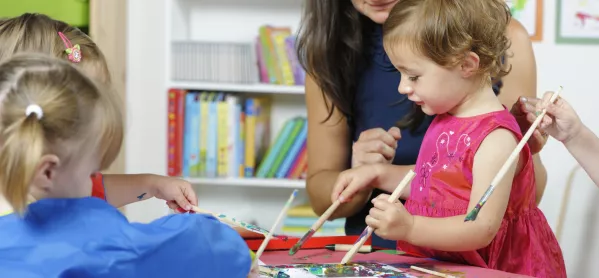What will be the early-years priority for the new government?

What is on the top of the to-do list for the new minister for childcare?
Yet to be appointed as David Cameron works his way down the list of roles to be filled, it could be a while before we know whether the previous postholder, Sam Gyimah, will rejoin his former boss Nicky Morgan at the Department for Education.
As a junior minister, Gyimah, 38, a former banker at Goldman Sachs, continued the drive for schools to take in two-year-olds.
This policy, not without its critics, was seen as one way of responding to the influential EPPSE (effective pre-school, primary and secondary education) longitudinal study, which as long ago as 2003 was reporting that pre-schoolers who were looked after by graduates - mostly teachers in the EPPSE study - had better outcomes as they advanced through education.
Others, including a University of Oxford study, have suggested that rather than enrolling young children into schools at a younger and younger age, private, voluntary and independent (PVI) nurseries could be helped to attract graduates.
But how best to do this?
Of course much of this comes down to status. Much of the provision for very young children is in the private and voluntary sector, and looking after babies and toddlers has long been a low-pay and low-status job.
Professor Cathy Nutbrown, head of the School of Education at the University of Sheffield, reviewed early-years qualifications for the coalition government. However, her fairly radical suggestion that a new category of formal initial teacher training should be created, taking in the period from birth to age 7 and ultimately leading to QTS, was rejected by ministers.
Instead those who qualify as early-years teachers graduate with a degree, but they can only specialise in care from birth to five-years-old and do not hold QTS.
All of this is given new urgency by political commitments. Before the election, Labour and the Conservatives were talking about how many free early-years places they could offer the nation’s working parents. Indeed the Tories, now ensconced in a majority government, ought to be looking to work out how they can deliver on their pledge to increase it for all three- and four-year-olds from 15 hours per week to 30 hours per week, for families “where all parents are working”.
But not everyone is happy. Lobby group Early Education, which counts among its members many leading academics and advisors, warned that there was too much emphasis on quantity and not enough on quality when it comes to early-years care.
Now Liz Bayram, chief executive of the Professional Association for Childcare and Early Years, has added her voice to this growing chorus: “Our priority will be to move the debate purely from issues of cost and accessibility to ensuring that childcare quality takes centre stage.”
This is all well and good, but the question remains: does the number of graduates with or without QTS in the sector have the same appeal to voters as a nice big juicy block of free childcare?
The government has pledged numbers and they are expecting to be judged on numbers. It is, though, a while until the next election and perhaps the ideal time for the less electorally-sexy conversations about qualifications and training to take place.
It should be a priority for the whole sector and it really ought to be on the ministerial to-do list.
Keep reading for just £1 per month
You've reached your limit of free articles this month. Subscribe for £1 per month for three months and get:
- Unlimited access to all Tes magazine content
- Exclusive subscriber-only stories
- Award-winning email newsletters



